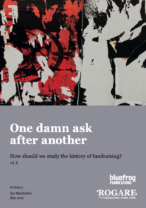“Just One Damn Thing After Another.”
The headline quotation, attributed to British historian Arnold Toynbee, pretty much summarizes the worst approach to teaching or slearning history. Lists of battle. Names of great men. “Just one damn thing after another.”
In fact, to seriously study history rather than memorize lists, is to look into causes of and relationships between people and events. Any historian worth her salt doesn’t just record what happened but attempts to explain why. And this is why the study of history includes historiography and the philosophical theories of history.
Sadly, the history of fundraising is mostly of the more damn lists, campaigns and great men variety. I say “sadly” because the serious study of history is an essential part of most every discipline. Physicians study the history of medicine. Scientists study the history of science and on and on. Deep understanding of any field requires the study of its history.
How many young fundraisers (or even old veterans) know what what fundraising and fundraisers did to advance women’s suffrage… to abolish slavery…advance LGBTQ rights…pull off the American revolution…weaken the once-awesome power of political parties…keep foundations from ruling the roost…shame governments into feeding the famished…and on and on?
From abortion to zoology and every issue in between the history of fundraising is packed full of miracles–and disappointments– sacrifices –and scandals– that help explain who we are, what we do, why and how it works, and most importantly, why it matters.
It also matters how concepts and practices in our field arose, grew, then faded away only to spring back to life generations later or in different parts of the world. Name the trend or topical fundraising jargon of the day –donor-centric, community centric, gender-centric, racial-centric– there’s history involved and it’s valuable to explore and understand it.
That’s why I was delighted this week when Rogare, the fundraising think tank, launched a most interesting, needed and aptly named project with along with a fascinating paper—One Damn Ask After Another—How Should We Study the History of Fundraising .
 You can download the discussion paper One damn ask after another: How ought we study fundraising history? Versions are available optimized for desktop, tablet and printing.
You can download the discussion paper One damn ask after another: How ought we study fundraising history? Versions are available optimized for desktop, tablet and printing.
At the same time Rogare issued a call for volunteers to join a study or discussion group to consider the historiography—how history is studied and written—of fundraising.
The goal of the fundraising history project team, led by Rhyannon Boyd of the UK’s Bath NHS Foundation Trust, is far more than simply filling in factual gaps in the historical record of fundraising. The larger aim of this ambitious project is to raise questions about different ways to approach the writing the history of fundraising, and to identify how different insights into analyses of fundraising history.
For example, there is current a pronounced shortage of historical analyses that put fundraising in its social and cultural contexts…missing analyses of social conditions that enabled organized fundraising to take off and grow…and some folks have seen fundraising as a career, and some haven’t.
This effort is long overdue. As the project’s founders note: “Yes, there are many histories of philanthropy –of giving to charity; but there are far, far fewer of fundraising—asking people to give. There are just a handful of book chapters, some blogs and one or two (often out of print) books. And what is mainly focuses on fundraising in Britain and America. And it adopts the ‘Great Man’ approach to history chronicling the ideas and initiative put in place at various times by a handful of influential men (they are all men.)”
Here’s a brief summary of some of the research questions identified in the paper that may be pursued by the project team:
- The so-called ‘social problem’ of fundraising (a term used by Beth Breeze in her 2017 book The New Fundraisers) – how and why fundraising has caused so much unease with the public going back decades and perhaps even centuries, and what is the media’s role in addressing, solving or exacerbating the ‘social problem of fundraising’.
- Why do so many people fall into fundraising by ‘accident’?
- The role of women in the development of the profession/organization of fundraising
- Decolonization of fundraising
- Histories of particular types of fundraising
- National fundraising histories, particularly in non-English speaking countries.
This is a new undertaking, a work in progress. AND…its progress and value depend on each of us doing our part. Right now the founding volunteer corps for this effort has one fundraiser from Canada, Spain, Ireland and Italy and 10 from the U.K
So far, the rest of the world is unrepresented.
[ Perhaps some history of the role of women in funding the American revolt against King George III is in order. ]
Anyone who would like to be a part of this project, in any way, shape or form, should reach out to the project leader Rhyannon Boyd on LinkedIn. Alternatively, you can email Rhyannon via Ian MacQuillin at Rogare – ianmacquillin@rogare.net
I’m signing up and hope you will too. This project deserves the support and involvement of all fundraisers who care about our past and what it can mean for our future.
Roger


